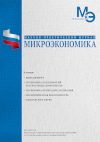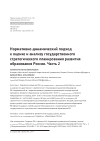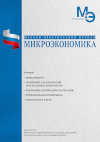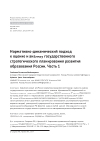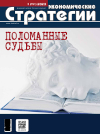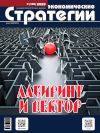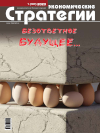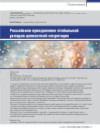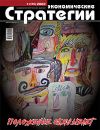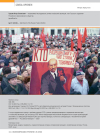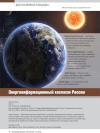Normative-dynamic approach to assessment and analysis of state strategic planning for the development of education in Russia. Part 2
DOI: 10.33917/mic-2.115.2024.92-105
The article proposes a normative-dynamic approach, new for Russia, to the assessment and analysis of state strategic planning for the development of education in the Russian Federation, aimed at improving the management of the implementation of the state program «Development of Education» for the period 2018-2025 and the national project «Education» for the period 2024-2030. Based on the use of rank correlation methods and taking into account the current legislative acts and strategic planning documents, various options for the current, short-term, medium-term and long-term normative and dynamic assessment of the development of education in the Russian Federation are considered. The conclusion is made about the weak scientific validity and low effectiveness of the state strategic planning of the State Program for the development of education in the Russian Federation.
References:
[1–8] see No. 1(114)/2024. pp. 99–100.
9. Analysis of state programs – 2021. GP-02 «Development of Education» [Electronic resource]. URL: https://ach.gov.ru/upload/
10. Federal Law of December 8, 2020 No. 385-FZ «On the federal budget for 2021 and for the planning period of 2022 and 2023» [Electronic resource]. URL: http://publication.pravo.gov.ru/Document/
11. Heckman J.J. Policies to foster human capital. Research in Economics. 2000. Vol. 54. pp. 3–56.
12. Soldatov R.V., Afonina I.A. Normative-dynamic approach to the assessment and analysis of state strategic planning for the development of education in Russia. Part 1. Microeconomics. 2024;1:94–100. (In Russ.). https://doi.org/10.33917/mic-1.114.2024.94–100.
13. Report on the interim results of an expert-analytical event to monitor the progress of implementation of NGOs, 2024. pp. 31. [Electronic resource]. URL: https://ach.gov.ru/upload/iblock/
14. Russian statistical yearbook, 2022. pp. 189–215. [Electronic resource]. URL: https://rosstat.gov.ru/storage/
15. Report to the Federal Assembly of the Russian Federation on the implementation of state policy in the field of education (2023) [Electronic resource]. URL: http://static.government.ru/media/files/


